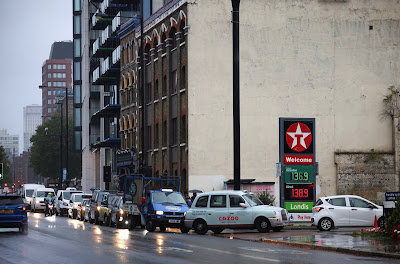LONDON — In the northern English town of Baildon, Jag Sanghera took the train to work instead of driving, saving fuel needed to drive his daughter to nursery school. In west London, Laid Ibrahim, an Uber driver, tried at least seven gas stations before finding one open at 2 a.m. and waiting in line for 80 minutes. Across the city, Nick Day said the private ambulance service he works for was forced to cut the number of its vehicles on the road from six to four.
As the government tried to calm an anxious nation on Monday, gas stations across Britain continued to run dry and thousands of Britons found their lives upended.
Officials said there was no shortage of fuel and blamed the problems on panic buying. But analysts said the real cause of the chaos is a chronic shortage of truck drivers to deliver fuel to gas stations, and the government late Monday said it was putting a limited number of military tanker drivers on standby to be deployed if necessary.
Whatever the cause, the fuel supplies Britons once took for granted were vanishing, lines of vehicles clogged the streets near gas stations and some businesses that depend on fuel were suddenly at a standstill.
Dlu Uddin, the owner of Bricklane Minicab, a taxi service in east London, said he usually employs 10 drivers, but that since Sunday only two had shown up. The others do not want to drive too far from their homes because they are afraid of running out of fuel and not being able to get home, he said.
“The situation is really, really bad,” said Mr. Uddin, who said that the gas stations in his area were dry. “Never would I have a dream about this happening in England.” » | Stephen Castle, Jenny Gross and Aina J. Khan | Published: Monday, September 27, 2021; Updated: Tuesday, September 28, 2021
